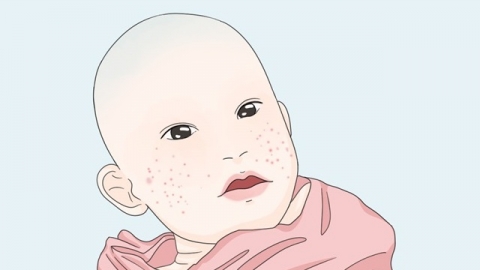What should infants with eczema avoid eating?
Generally, infants with infantile eczema should avoid consuming foods such as milk, egg yolks, cod, mangoes, and peanuts. They should also not take medications such as chlorpheniramine maleate tablets, diphenhydramine hydrochloride tablets, cetirizine hydrochloride drops, loratadine syrup, or desloratadine dry suspension on their own. Detailed explanations are as follows:
I. Foods
1. Milk
Some infants are allergic to casein and whey proteins in milk. These proteins can stimulate the immune system to produce inflammatory reactions, worsening eczema symptoms such as redness and itching. Infants with allergic constitutions should especially avoid milk.
2. Egg Yolks
Egg yolks contain allergenic proteins. Since infants' digestive and immune systems are not fully developed, they may not digest and absorb these proteins effectively, leading to allergic reactions that can worsen eczema. It is recommended to cautiously try small amounts only after the condition has stabilized while closely observing for any reactions.

3. Cod
As a deep-sea fish, cod contains foreign proteins that may act as allergens. After consumption, these proteins may activate the immune system, releasing inflammatory mediators that expand the eczema rash area and intensify itching, thus hindering recovery.
4. Mangoes
Mangoes contain urushiol-like substances that can irritate an infant's delicate skin, causing contact allergies. Additionally, their high sugar content may exacerbate skin inflammation, worsening eczema symptoms. It is not recommended to feed mangoes to infants with eczema.
5. Peanuts
Peanut proteins are highly allergenic. Consumption by infants may trigger severe allergic reactions, not only worsening eczema but also potentially causing symptoms such as vomiting and diarrhea, which pose significant health risks to infants.
II. Medications
1. Chlorpheniramine Maleate Tablets
This antihistamine may relieve itching but can cause drowsiness and dry mouth in infants due to immature liver and kidney function. It may also affect nervous system development. Self-administration is strictly prohibited.
2. Diphenhydramine Hydrochloride Tablets
Also an antihistamine, excessive use in infants may cause irritability and dizziness due to weak metabolic capacity, disrupting normal sleep patterns. Use and dosage must be determined strictly under a physician's guidance.
3. Cetirizine Hydrochloride Drops
Although it can relieve allergies, infants may experience drowsiness and fatigue after use. Dosage is difficult to control, and self-administration may harm health due to incorrect dosing. Medical advice must be followed.
4. Loratadine Syrup
As an antihistamine, infants have poor metabolic capacity for this drug. Self-administration may cause discomfort such as headache and dry mouth and may affect normal physiological functions. Medical guidance is necessary.
5. Desloratadine Dry Suspension
Although relatively mild, its use in infants may still cause adverse reactions such as diarrhea and rashes. Precise dosing is required, and self-administration often leads to dosage errors that can endanger infant health.
In daily care, it is important to keep the infant's skin clean and moisturized, choose cotton clothing, and avoid contact with allergenic substances. If eczema worsens or exudation or infection occurs, timely medical attention should be sought, and standardized treatment should be followed under a physician's guidance.









